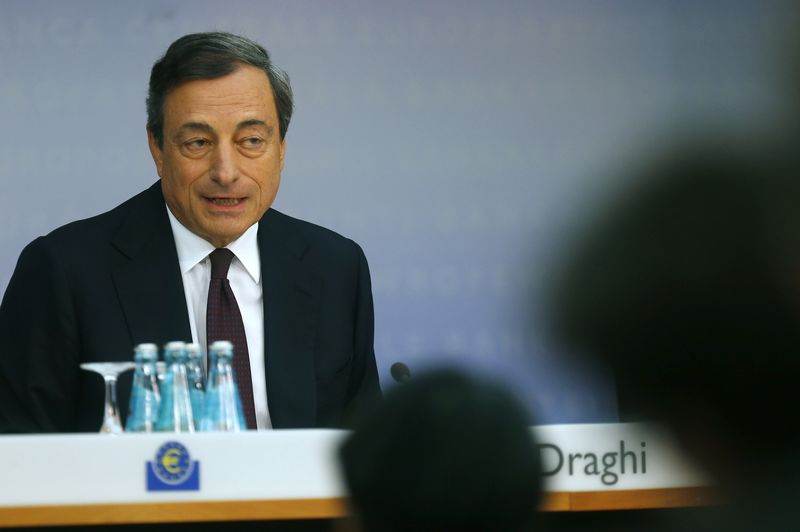Investing.com - In the week ahead, global financial markets will focus on the outcome of Thursday’s European Central Bank meeting for fresh clues on when the central bank will shift away from its ultra-easy policy.
Investors will also pay close attention to a monetary policy decision due in Japan amid speculation the Bank of Japan will lag well behind major global central banks in dialing back its massive stimulus program.
Elsewhere, China is to release what will be closely watched growth data amid recent signs of cooling in the world's second biggest economy.
In the U.K., market participants will be looking ahead to a report on consumer price inflation for further hints on the strength of the economy and the likelihood of the Bank of England raising interest rates this year.
Traders will also eye data on the U.S. housing sector to gauge the strength of the world's largest economy and how it will impact the Federal Reserve's view on monetary policy.
Ahead of the coming week, Investing.com has compiled a list of the five biggest events on the economic calendar that are most likely to affect the markets.
1. European Central Bank policy meeting
The European Central Bank's latest interest rate decision is due at 1145GMT (7:45AM ET) on Thursday, with no big changes expected.
Most of the focus will be on President Mario Draghi's press conference 45 minutes after the announcement, as investors look for more clues on when and how the ECB could scale back its massive quantitative easing program.
Market experts believe the central bank is likely to wait until September before announcing a tapering of its 60 billion euros of monthly asset purchases.
Besides the ECB, market participants will be focusing on Tuesday's ZEW survey data on German economic sentiment to gauge confidence in the euro zone's largest economy.
2. Bank of Japan monetary policy decision
The Bank of Japan is not expected to make any changes to its monetary policy at the conclusion of its two-day rate review on Thursday, as robust exports and private consumption heighten prospects of a moderate economic expansion.
According to sources, the Japanese central bank is likely to upgrade its economic assessment but cut its rosy inflation outlook, reinforcing expectations it will lag well behind major global central banks in dialing back its massive stimulus program.
BOJ Governor Haruhiko Kuroda will hold a press conference afterward to discuss the decision. He is likely to remind markets of the BOJ's resolve to maintain its ultra-easy policy until inflation is sustainably above 2%.
In addition, investors will focus on monthly trade data due Thursday, which could show Japanese exports rising for a seventh consecutive month.
3. China Q2 GDP
China is scheduled to release data on second quarter gross domestic product at around 0200GMT on Monday (10:00PM ET Sunday).
The report is expected to show the world's second largest economy grew 6.8% in the three months ended June 30, tempering initial worries of a sharper slowdown as Beijing walks a policy tightrope with its quest to crackdown on financial risks and limit damage to the economy.
The Asian nation will also publish data on June industrial production, fixed asset investment and retail sales along with the GDP report.
4. U.K. inflation figures
The U.K. Office for National Statistics will release data on consumer price inflation for June at 0830GMT (4:30AM ET) on Tuesday. Analysts expect consumer prices to rise 2.9%, the highest level in nearly four years.
The recent surge in inflation, caused largely by the plunge in sterling following last year's Brexit vote, has prompted some Bank of England policymakers to call for higher interest rates in the months ahead.
Besides the inflation report, the ONS will produce data on June retail sales on Thursday, with analysts expecting an increase of 0.4%.
Recent data has pointed to signs that rising inflation is crimping spending by consumers, the main drivers of the economy, just as the country is set to start EU divorce negotiations.
5. U.S. housing data
The Commerce Department is to publish a report on housing starts and building permits for June at 8:30AM ET (1230GMT) on Wednesday. The data could show that permits rose 3.0% to 1.200 million last month, while housing starts are forecast to gain 5.8% to 1.150 million.
Besides the housing data, this week's calendar also features surveys on manufacturing conditions in the Philadelphia and New York regions as well as weekly jobless claims.
Dovish comments from Fed Chair Janet Yellen last week combined with soft inflation data saw investors temper their expectations for tighter monetary policy in the months ahead. Futures traders are pricing in around a 40% chance of a rate hike by the end of the year, according to Investing.com’s Fed Rate Monitor Tool.
In addition to the data, this also marks the first big week of the second-quarter earnings season, with blue chips Johnson & Johnson (NYSE:JNJ), American Express (NYSE:AXP), Goldman Sachs (NYSE:GS), Microsoft (NASDAQ:MSFT) and General Electric (NYSE:GE) among some of the names reporting results this week.
Headlines from Washington regarding President Donald Trump's health-care plan will also be in focus.
Stay up-to-date on all of this week's economic events by visiting: http://www.investing.com/economic-calendar/
